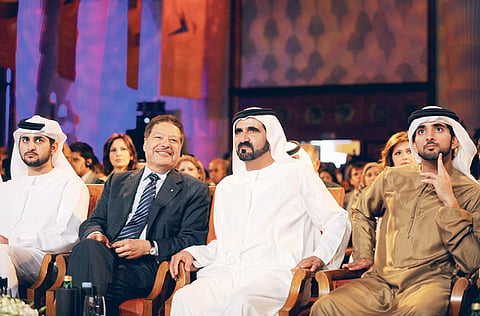Win back bright Arabs: Mohammad
UAE Vice President urges states to let intellectuals serve

Dubai: The lack of scientific research in the Arab world was at the centre of discussions at the ninth Arab Media Forum that started on Wednesday.
The forum was inaugurated by His Highness Shaikh Mohammad Bin Rashid Al Maktoum, Vice-President and Prime Minister of the UAE and Ruler of Dubai.
In an informal discussion with the press, Shaikh Mohammad said the Gulf Cooperation Council was one of the few remaining Arab blocs that bring together countries with strong bonds of geography, history, language, faith and traditions.
Shaikh Mohammad said the GCC consultative summit, which he attended on Tuesday, was necessary for the member countries to discuss the latest developments. He described the global financial crisis as an upheaval that led to recession in many economies.
"In the UAE, the crisis is more of a challenge that requires us to pause to re-arrange our priorities as we move on. The UAE and the rest of the GCC countries enjoy very strong infrastructure which makes a solid platform for new and creative economic thinking."
He added that the UAE was focusing mainly on the education and health care sectors because "they guarantee progress and prosperity for our people.
Ideal environment
Shaikh Mohammad praised the Arab intellectuals who attained prominence worldwide.
"The Arab governments should take steps to win them back. They should provide the ideal environment for them to innovate and to serve their countries in the best way."
Shaikh Mohammad urged journalists and writers to always adhere to the truth and to assume responsibility for what they write.
In the presence of Shaikh Hamdan Bin Mohammad Bin Rashid Al Maktoum, Dubai Crown Prince, Nobel Laureate Dr Ahmad Zuwail delivered a keynote speech at the opening ceremony, titled ‘Building the Future: the role of science and media'.
Dr Zuwail discussed illiteracy and the lack of scientific research in the Arab world as among the main challenges to progress and development. "Within 10 to 20 years, the US will send the first manned mission to Mars, and many countries are trying to explore space for various reasons, such as finding new sources of energy, or controlling the Earth from other planets," he said.
"Meanwhile, scientists are working on creating stem cells from skin cells, which they can use to create new tissues such as hearts, eyes and other body parts. This was mere imagination less than 20 years ago and would result in a radical change in medical practice," he said.
Dr Zuwail said while technology could be bought, there was still a need for qualified people to implement it. He said challenges facing the region included the danger of adopting imitation rather than modernisation and high illiteracy rates which left almost half the region's people unable to read. He recommended that the media adopt scientific methods by seeking the truth and verifying facts before publishing, especially now that people have more control over what they see and read.
Sign up for the Daily Briefing
Get the latest news and updates straight to your inbox



